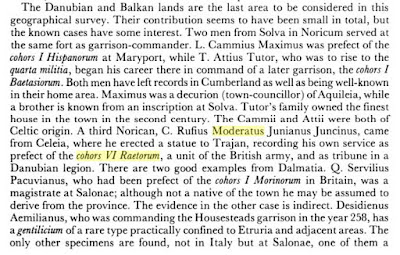On
February 26, 1996, I received a letter from Professor Oliver Padel of
Cambridge. This was in response to a query I had sent him some time earlier in
which I proposed that the name Medrawt – born by the personage who died with
Arthur at Camlann – may represent the Roman name Moderatus. What Padel had to say
on this possibility is important enough for Arthurian studies to be reprinted
in full below:
“Not
much has been done on the name of Medrawt or Mordred… In an article on various words
in Welsh with the root med, Medr-, Ifor Williams suggested that the name might
be connected with the Welsh verb medru ‘to be able, to hit’; but he did not
develop the idea, only mentioned it in passing.
Middle
Welsh Medrawt cannot formally be identical with Old Cornish Modred, Old Breton Modrot
(both of which are recorded, indicating an original Old Co.Br. *Modrod), since
the Welsh e in the first syllable should not be equivalent to a Co.Br. o there.
What
people do not seem to have asked is what this discrepancy means: we can hardly
say that Welsh Medrawt is a different name, since it clearly belongs to the
same character as Geoffrey’s
[Geoffrey of Monmouth] Modredus < Co.Br. Modrod.
Which
is ‘right’? I would suggest that the Co.Br. form is the ancient one, and that
the Welsh form has been altered, perhaps indeed by association with the verb
medru.
That
was already my conclusion, but I did not have a derivation for Modrod. However,
Modrod would be the exact derivative of Latin Moderatus, as you suggest. Your
suggestion is most attractive, and neither I nor (so far as I know) anyone else
has previously thought of it.
Like
you, I should be relucatant to say that Modrod couldn’t have a Celtic
derivation; but it fits so well with Moderatus that I personally don’t feel the
need to look further.”
If
Medrawt or, rather, Modrod, is Moderatus, this may be significant for a Medraut
at Cambloglanna on Hadrian’s Wall, for we know of a Trajanic period prefect
named C. Rufius Moderatus [1], whose unit left inscriptions at Great Chesters on the Wall
and Brough-under-Stainmore in Cumbria (CIL iii. 5202, RIB 1737, 166-9, 2411,
147-51). The name of this prefect could have become popular in the region and
might even have still been in use among Northern British noble families in the 5th-6th centuries CE.
The Welsh tradition makes Medrawt a son of Llew son of Cynfarch. Cynfarch, of course, was father of the famous Urien of Rheged, a kingdom whose origin lay in Annandale (https://mistshadows.blogspot.com/2017/09/the-nucleus-of-uriens-kingdom-of-rheged.html). I have suggested before that Arthur's fall at Camlan may have been due to the expansion of Rheged.
Here is the listing for Llew as drawn from P.C. Bartrum's A CLASSICAL WELSH DICTIONARY:
Here is the listing for Llew as drawn from P.C. Bartrum's A CLASSICAL WELSH DICTIONARY:
LLEW ap CYNFARCH. (Fictitious).
The name is used in Brut y Brenhinedd where Geoffrey of Monmouth has Loth (HRB VIII.21,
etc.). As Loth was made the father of Walganus and Modred (HRB IX.9), so Llew became the father of
Gwalchmai and Medrod. Loth was the brother of Urianus and Auguselus (HRB IX.9) and these brothers
become Llew, Urien and Arawn in ByB. It is not easy to explain the change; one explanation is
suggested under Arawn (q.v.). Loth, as eponym of Lothian, corresponds to Lleuddun Luyddog (q.v.), but
this was evidently not realised by the compilers of ByB.
Llew is listed as a son of Cynfarch with Urien and Arawn in the triad of the ‘Three Fair WombBurdens’ of Ynys Prydain (TYP no.70 - Pen,47), and in the ‘Hanesyn Hen’ tract (ByA §6). Some late
versions, based on HRB, give Medrod and Gwalchmai as sons of Llew ap Cynfarch (ByA §8 in EWGT
p.87).
[1]


No comments:
Post a Comment
Note: Only a member of this blog may post a comment.